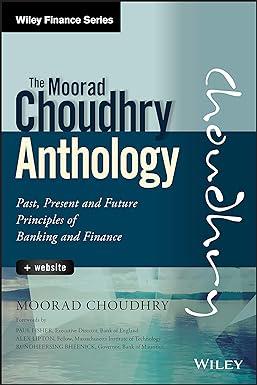Question
John was learning about currency swap agreements. John was confused why would company A agree to such a swap agreement. If we take a look
John was learning about currency swap agreements. John was confused why would company A agree to such a swap agreement. If we take a look at the interest rate offered to both companies from the market:
|
| Borrow U.S. Dollar | Borrow British Pound |
| Company A | 8% | 11.6% |
| Company B | 10% | 12% |
Based on the market offer, company A has the comparative advantage of borrowing U.S. dollar, and company B has the comparative advantage of borrowing British pound (it is intuitive since company A is headquartered in U.S. and company B is headquartered in U.K.). However, company A wants British pound for its U.K. expansion, while company B wants U.S. dollar for its U.S. expansion.
The swap agreement: company A borrows U.S. dollar at 8% from the market, and company B borrows British pound at 12% from the market. Then they sit down and do the swap. After the swap, A pays net 11% on the British pound, and B pays net 9.4% on U.S. dollar.
The problem is, it looks like company B is completely ripping company A off!
Johns question was, why doesnt company A just borrow U.S. dollar and exchange it to British pound to fund its business? This way, company A only pays 8% interest on U.S. dollar. Why on earth would company A agree to such a swap and eventually pay 11% interest on the British pound, even though 11% interest rate on British pound is 0.6% lower than the U.K. market offers? Why on earth would company A ever want to pay interest based on U.K. market rate which is much higher than the rate in U.S. market?
Step by Step Solution
There are 3 Steps involved in it
Step: 1

Get Instant Access to Expert-Tailored Solutions
See step-by-step solutions with expert insights and AI powered tools for academic success
Step: 2

Step: 3

Ace Your Homework with AI
Get the answers you need in no time with our AI-driven, step-by-step assistance
Get Started


